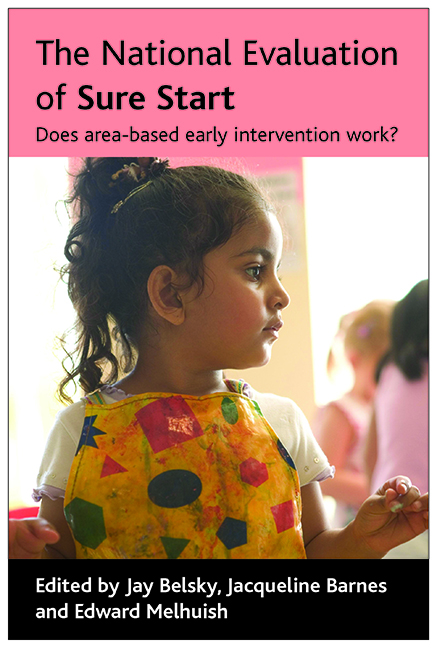Book contents
- Frontmatter
- Contents
- List of tables and figures
- Foreword
- List of abbreviations
- Notes on contributors
- Part One The historical and policy context
- Part Two The local context of Sure Start Local Programmes
- Part Three The implementation of Sure Start Local Programmes
- Part Four The impact of Sure Start Local Programmes
- Part Five Conclusion
- Index
two - Targeting deprived areas: the nature of the Sure Start Local Programme neighbourhoods
Published online by Cambridge University Press: 15 September 2022
- Frontmatter
- Contents
- List of tables and figures
- Foreword
- List of abbreviations
- Notes on contributors
- Part One The historical and policy context
- Part Two The local context of Sure Start Local Programmes
- Part Three The implementation of Sure Start Local Programmes
- Part Four The impact of Sure Start Local Programmes
- Part Five Conclusion
- Index
Summary
Communities and neighbourhoods are the places in which children develop. Sure Start was, in its inception, an area-based initiative with certain types of neighbourhoods as targets – those that were among the most disadvantaged with high concentrations of families with young children. Each Sure Start Local Programme (SSLP) was expected to focus on developing and enhancing services for residents of a relatively small, disadvantaged neighbourhood that would be defined locally. As Naomi Eisenstadt notes in the Foreword, SSLP areas were conceptualised in terms of ‘pram-pushing distances’ and partnership boards were encouraged to think of local need and to avoid pre-existing boundaries such as electoral wards or school catchment areas when defining programme-area boundaries. Once the neighbourhood had been defined, underpinning all other aspects of service delivery and the evaluation, there needed to be a detailed picture of each area that had been selected so that it would be possible to describe not only the ‘average’ SSLP neighbourhood but also the extent to which there was variability among them. Only with such information could the results of the implementation, impact and cost effectiveness modules of the evaluation be fully interpreted. In addition, as described in Chapter Ten, the impact of the initiative on the communities themselves could be evaluated by looking at how the areas – that is, their characteristics – changed over time as the Sure Start programmes developed.
Accurate information about social conditions at the local level provides a powerful tool for helping local and national initiatives to pinpoint problems and target solutions, and the guidance provided by the Sure Start Unit (SSU) encouraged programmes to find out about their areas in as much detail as possible. Varied features of neighbourhoods are known to be relevant to parenting and children's development – both targets of SSLPs. The extent to which many families in an area are headed by one adult, and the number of vacant houses and the extent of poor housing in the area have also been found to predict family problems such as child abuse in the US (Coulton et al, 1996) and the UK (Sidebotham et al, 2002). Even after taking family characteristics into account, the extent of poverty and unemployment in a neighbourhood is a predictor of children's health and academic achievement, child behaviour problems and child abuse and neglect (Leventhal and Brooks-Gunn, 2000).
- Type
- Chapter
- Information
- The National Evaluation of Sure StartDoes Area-Based Early Intervention Work?, pp. 25 - 44Publisher: Bristol University PressPrint publication year: 2007

